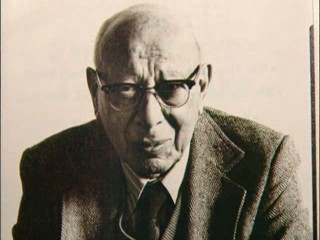
Bruno Bettelheim biography
Date of birth : 1903-08-28
Date of death : 1990-03-13
Birthplace : Vienna, Austria
Nationality : Austrian
Category : Famous Figures
Last modified : 2011-01-25
Credited as : child psychologist and writer, ,
Bruno Bettelheim, a controversial Austrian-born American psychoanalyst and educational psychologist, pioneered in the application of psychoanalysis to the treatment of emotionally-disturbed children
On Aug. 28, 1903, Bruno Bettelheim was born in Vienna. He received his doctorate from the University of Vienna in 1938. When Austria fell to Hitler, Bettelheim was sent to a concentration camp, but was able to go to the United States in 1939, becoming a citizen five years later.
During his formative years in Vienna, Bettelheim was influenced by World War I, the Bolshevik Revolution, and Sigmund Freud. Like other Viennese intellectuals, he could not accept the optimism and complacency of preexisting Western European ideals. In their search for new pathways, his generation chose between the new social changes reflected in Russian communism and later National Socialism, and the excitement of the new psychoanalysis pioneered by Freud. Bettelheim opted for psychoanalysis, yet his work always reflected interest in the impact of social systems on individuals.
Bettelheim married Trude Weinfeld in 1941, and they had three children. Except for two years at Rockford College in Illinois, he worked principally at the University of Chicago, where in 1963 he became Rouly professor of education and professor of psychology and psychiatry.
Bettelheim won fame from his books and articles in both the scientific and popular press. His passionate, intensely personal, and anecdotal style drew some criticism from the scientific community, though few questioned his talent for conceptualization and for developing provocative, imaginative ideas.
His major contributions came from his work at the Sonia Shankman Orthogenic School of the University of Chicago, a residential treatment institution for rehabilitating children with severe emotional disturbances, where he became principal in 1944. In Love Is Not Enough (1950) and Truants from Life (1955), he described the school's educational and therapeutic philosophy, largely his own creation. These ideas are elaborated, with case material, in The Empty Fortress: Infantile Autism and the Birth of the Self (1967). He viewed the behavior of severely withdrawn children as resulting from overwhelmingly negative parents interacting with infants' susceptibility during critical early stages in their psychological development. The children hold themselves responsible for external catastrophes and withdraw into fantasy worlds as if to prevent further destructive behavior. Bettelheim likened this destructive dehumanizing of a child to the effects of Nazi concentration camps on the inmates, deriving many of these ideas from his own experience, described in The Informed Heart (1960). His treatment method involved an unconditional acceptance by the school's staff of all such children's behavior. For these theoretical and therapeutic views he had followers and critics. For example, Bettelheim's assumptions on autism have since been dismissed. It is widely acknowledged that autistic and emotionally-disturbed children are not the same.
A popular speaker, Bettelheim traveled widely in his work. The Children of the Dream (1969) reports his studies on an Israeli kibbutz of the methods and results of communal child rearing, which he felt had important implications for American education. His 1976 book, The Uses of Enchantment, was a popular psychoanalytical look at fairy tales.
In 1990 Bettelheim committed suicide. Soon after, allegations arose that he had falsified many of his credentials and had been physically abusive to the children in his care. Many feel his suicide is proof that the allegations were true, but others staunchly defend Bettelheim's work. Regardless of which interpretation is correct, Bettelheim's impact cannot be denied.
Pollak, Richard, The Creation of Dr. B: A Biography of Bruno Bettelheim (1997).
Sutton, Nina, Bettelheim, A Life and Legacy (1996).
















